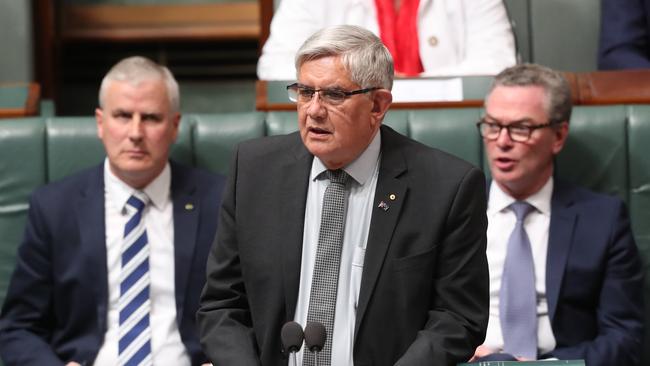Ken Wyatt admits funding freeze hit older Australians in care
The minister concedes there was a funding freeze in a government measure for older Australians, days after denying a cut.

Aged Care Minister Ken Wyatt has conceded there really was a funding freeze in a crucial government measure that subsidises the medical and nursing needs of older Australians in residential homes, days after denying a cut.
Mr Wyatt confirmed in parliament yesterday that the Coalition had “capped” spending on the Aged Care Funding Instrument while funding more places in both residential and home care over successive budgets.
“The funding instrument was capped at a time in which there were claims that were much higher than the trajectory and all governments have a responsibility to live within their means and within the budget that is established,” Mr Wyatt said.
“But we have not cut, because we have continued to grow the ACFI level of funding over the forward estimates and they will continue to grow, but the new RUCS (study into cost of care) program that we are working on with Wollongong University will provide a better instrument for assessing people.”
The ACFI was scheduled to grow by more than $3 billion over the forward estimates but after a government decision, that figure was reduced to $1.8bn.
Labor leapt on the admission.
Opposition aged care spokeswoman Julie Collins said the changing account from the government was “embarrassing” for Scott Morrison. “This savage cut hit older Australians in residential aged-care facilities the hardest, with a 50 per cent cut to the indexation of complex healthcare subsidies,” she said.
Bill Shorten wrote to the Prime Minister yesterday urging him to include in the royal commission terms of reference the impact of these funding reductions and “adequacies of short and long-term funding of the aged-care sector”.
The Opposition Leader also requested the terms of reference include the “adequacies of care requirements for residents in aged-care facilities”.
“It is also Labor’s strong view that Labor should provide advice and be consulted on the appointment of the commissioner, given the timing of the royal commission and its proximity to the next election,” he said in his letter.
Successive reports commissioned by Mr Wyatt have linked the low growth in the ACFI to financial uncertainty in the sector and lower care standards.
The chief executive of Estia Health, one of the largest listed aged-care providers in Australia, said debate over whether the 2016 changes were a cut should be put to bed. “Changing the methodology was effectively a cut, there is no question about that, and there was an indexation pause as well,” Norah Barlow said.
“Our costs went up and the ACFI did not.”
National Seniors Australia chief advocate Ian Henschke told The Australian the royal commission ought to discover where this money ended up.
“Whether they are profit or not for profit, we hope the royal commission will look forensically at where the money is being spent,” he said.
“We know that some homes are not spending the money they receive from taxpayers on the care people need. Industry insiders are telling us that a good standard is to spend 70 per cent of budget on direct resident care (wages, salaries, training) but many homes are spending just 50 per cent.”



To join the conversation, please log in. Don't have an account? Register
Join the conversation, you are commenting as Logout